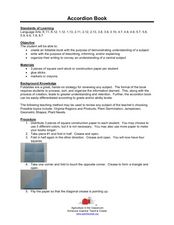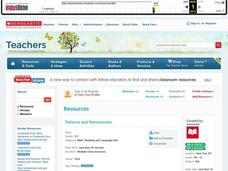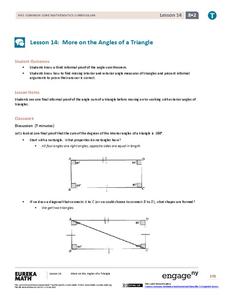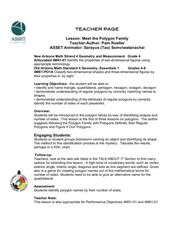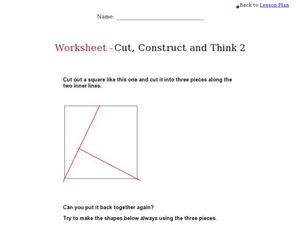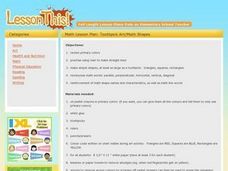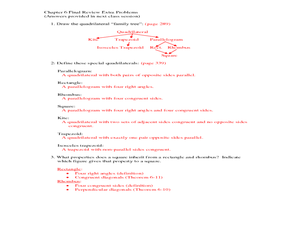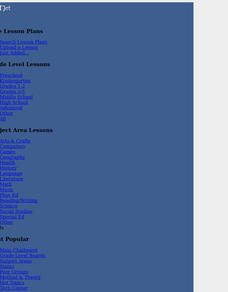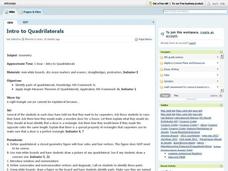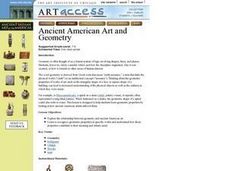Curated OER
Reflection: Student Worksheet
In this math worksheet, students will work independently to trace a stencil on an x-axis. Then students will follow a procedure to trace the image on the horizontal line of reflection. Students will observe that reflections and rotations...
Curated OER
How Many Regular Polyhedrons Are There In This or Any Universe?
Students examine the idea of "regularity" as it pertains to geometry. In this geometry lesson students complete several assignments that are part of trihedral angles and regular polyhedrons.
Curated OER
Polygon Area Review Sheet
For this polygon area worksheet, high schoolers answer 8 questions involving the area of several polygons. Students are given various details of the polygon and must find lengths of various polygons.
Curated OER
Properties of Quadrilaterals
In this properties of quadrilaterals activity, students use the properties of quadrilaterals to find the perimeter, angle measurement or length of a missing side of a given polygon. Examples and explanations of the properties are...
Curated OER
Chopping Cubes
Middle schoolers work in small groups to make various geometric solids with Play-Doh. They use fishing line to make cuts and observe the shapes of the cross-sections. Pupils complete an assessment in which they answer questions such as:...
Teach Engineering
Determining Densities
Don't be dense—use a robust resource. The second installment of a five-part Floaters and Sinkers unit has learners determine the densities of several objects. As part of the activity, they learn the displacement method for finding...
Curated OER
Amazing Triangles
Student scientists investigate triangle structures. In this building lesson plan, students explore how to design triangle braces in the construction of structures in order to build a stronger base.
Curated OER
Accordion Book
Learners make an accordion book to show information that is associated with a particular learning event. In this accordion book instructional activity, students follow paper-folding directions to make the book. They fill the book with...
Noyce Foundation
Parallelogram
Parallelograms are pairs of triangles all the way around. Pupils measure to determine the area and perimeter of a parallelogram. They then find the area of the tirangles formed by drawing a diagonal of the parallelogram and compare their...
Primary Resources
Coordinate Pairs: An Introduction
Ordered pairs, the x and y-axis - sounds like it's time to introduce learners to the plotting points on a graph! This presentation is great as it introduces the concept, provides an example of how to use a coordinate plane, and then...
Curated OER
Patterns and Pentominoes
Students solve pentomino puzzles. In this problem solving lesson, students discuss how pentomino puzzles play into the plot of Chasing Vermeer by Blue Balliett and practice solving a pentomino puzzle on their own....
EngageNY
More on the Angles of a Triangle
Angles and triangles: they're all connected. Uncover the connections between angles in triangles. Scholars learn how to find both exterior and interior angle measures in triangles. The lesson emphasizes the vocabulary related to these...
Curated OER
Who Am I? (Middle School)
Third graders complete a classroom game used to build understanding of two and three-dimensional shapes. Diagonals, sides, regularity, congruency, angle measurements, parallels, perpendicular, faces, and edges are a few of the vocabulary...
Curated OER
Cutting Sandwiches
Learners discuss shapes and their characteristics. As a class, they explore shapes made from a square. Students explore triangles, squares, fractions of a square such as a half and a quarter. Individually, they complete worksheets, and...
Curated OER
Flag Folding
Students study the effects of combining, subdividing, and changing basic shapes to figure out the official method for folding the US flag. They complete a prediction sheet to determine how to get the flag folded so that only the blue...
Curated OER
Meet the Polygon Family
Fourth graders investigate regular polygons. In this regular polygon lesson, 4th graders explore the attributes of different polygons. Students work in groups to complete a KWL chart regarding polygons.
Curated OER
Cut, Construct, and Think 2
In this square worksheet, learners cut a square into 3 shapes, try and put it back together, and draw shapes that have the same vertices, sides, and diagonals as the cut out shapes. Students draw 4 shapes.
Curated OER
Toothpick Art
Young scholars review primary colors and practice making straight lines. For this visual arts lesson, students paint simple shapes as large as a toothpick, using specific primary colors. During the construction of the shapes young...
Curated OER
Polygons and Sketching
In this geometry worksheet, students define and draw quadrilaterals. They differentiate between the different shapes. There are 3 questions with an answer key.
Curated OER
Platonic Solids
Students identify different types of polygons. In this geometry lesson, students differentiate between convex and regular shapes. they identify the names of two and three-dimensional objects.
Curated OER
Quadrilateral Bunny
Students identify the properties representing quadrilateral. In this geometry lesson plan, students differentiate between special and regular quadrilaterals. They discuss and demonstrate hierarchy of quadrilaterals.
Curated OER
Lesson Exchange: Polygons (Middle, Mathematics)
Students discover the relationship between the sides of a polygon and the number of diagonals that can be drawn from one vertex, the number of triangles that those diagonals form, and the sum of the interior angles of that polygon.
Curated OER
Intro To Quadrilaterals
Students engage in a lesson that is concerned with the concept of quadrilaterals and how they are used to create a rectangle for a door. They create a drawing of a quadrilateral while finding the sum of the angles. They practice problems...
Curated OER
Ancient American Art and Geometry
Students explore the relationship between geometry and ancient American art. They see how to recognize geometric properties in specific works and explain how these properties contribute to their meaning and artistic merit.









